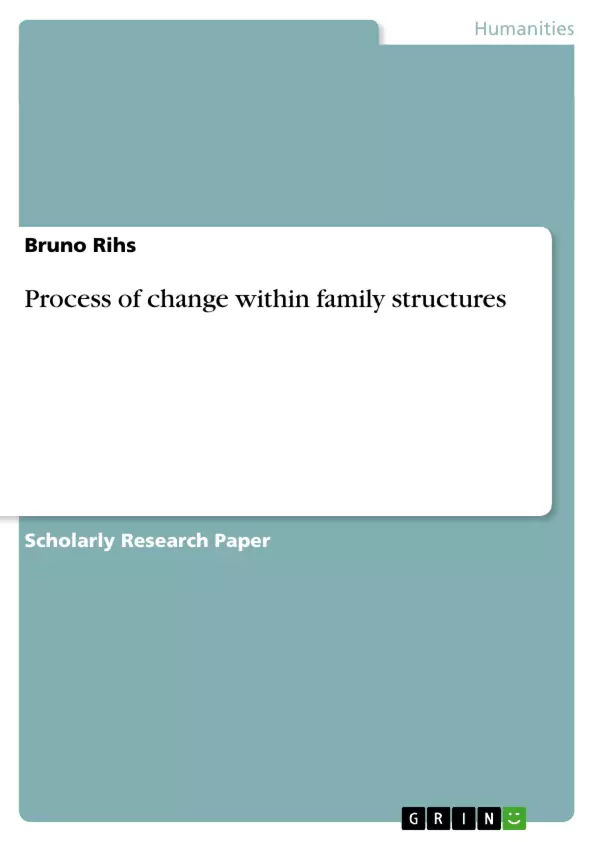In this paper, the author is going to look at the different perspectives on change. He is trying to link them with his work experience as a change agent in the field of education and family counselling. He looks at the role of different disciplines in achieving change and evaluates the implications for a personal practice. He concludes the assignment with guidelines to act as an effective change agent. Those implications will show the complexities of the different aspects of change.
Although most of the models are focused on management and business we can see, that there are many interesting similarities to the process of change in family structure. Names of models and exponents may be different but the nature of change stays the same. What the author takes out of this consideration is that change is a continuous process that goes through a series of phases. Every phase means a challenge with new experiences and new opportunities to learn. As learning is an individual process and individuals are responsible for controlling and managing their own process of change.
With the tendency to measure and to analyse all appearances in the world (processes of change included) we always react on the surface of the world. We are in danger to neglect the immeasurable aspects like feelings, attitudes and values, culture and norms. Different and contrasting perceptions of the reality are possible and correct. The either-or mentality is no longer valid and must be replaced by the “as well as” approach. Between the sky and the earth there exist unexplainable things of which we probably will never know how they work. Nevertheless we can use different approaches.
Inhaltsverzeichnis (Table of Contents)
- Introduction
- Different perspectives on the nature of change
- The role of different disciplines in achieving change
- Change in family structure
- Guidlines for change agents in families
- Reflexion of the implications for personal practice
- Conclusion
- References
Zielsetzung und Themenschwerpunkte (Objectives and Key Themes)
This assignment aims to analyze processes of change within family structures from a pedagogical perspective, drawing on experiences in education and family counseling. It explores different perspectives on change, examines the role of various disciplines in achieving change, and provides guidelines for effective change agents within families.
- The nature of change and its inevitability
- The role of different disciplines in understanding and explaining change
- The application of change management models in family contexts
- The role of the change agent in facilitating change within families
- The complexities and challenges of change processes in family structures
Zusammenfassung der Kapitel (Chapter Summaries)
- Introduction: The author introduces the topic of change within family structures and contrasts it with change management in business contexts, highlighting the unique challenges and characteristics of family dynamics. The author's professional background as a pedagogue provides a specific lens for examining family change.
- Different perspectives on the nature of change: This chapter explores different perspectives on change, comparing the arts and scientific approaches. It highlights the use of hermeneutics, dialectic, phenomenology in the arts approach and surveys, interviews, tests, and experiments in the scientific approach. The author uses the example of divorce to illustrate both perspectives and argues for the need to recognize change as a natural and inevitable process.
- The role of different disciplines in achieving change: This chapter examines the role of different disciplines, such as psychology, sociology, and business management, in achieving change. It highlights the contribution of disciplines such as Kotter's eight-step model for transforming organizations and Jick's ten-step model for implementing change. The author discusses the potential for conscious planning and management of change processes while acknowledging the influence of external factors.
- Change in family structure: This chapter focuses on the specific dynamics of change within family structures. It examines the unique features of families, such as the durability of membership, emotional interdependence, and the need to balance individual and family goals. The author explores the challenges and opportunities for change in family contexts, such as divorce, parental separation, and conflict resolution. The author's insights are drawn from her own professional experience as a change agent in the field of education and family counseling.
- Guidlines for change agents in families: This chapter delves into the practical aspects of facilitating change within families. The author provides guidelines for change agents, drawing from her own experience and the literature on change management. The chapter emphasizes the importance of sensitivity, empathy, and effective communication skills for change agents working with families.
Schlüsselwörter (Keywords)
The core keywords and focus topics of this assignment are: change management, family dynamics, pedagogy, educational interventions, family counseling, divorce, parental separation, conflict resolution, change agent, emotional interdependence, relationship building, communication skills, and the challenges and opportunities of family change processes.
Frequently Asked Questions
How does change management apply to families?
While often used in business, change models can describe the phases families go through during transitions like divorce or relocation.
What is the role of a "change agent" in family counseling?
A change agent, such as a pedagogue or counselor, facilitates the transition process by providing support, empathy, and effective communication strategies.
What are the challenges of change within family structures?
Challenges include emotional interdependence, conflicting individual goals, and the need to address immeasurable aspects like values and culture.
How can parents navigate separation using change models?
Models like Kotter's or Jick's can help understand that change is a continuous process with distinct phases requiring different coping mechanisms.
Why is the "as well as" approach important in family change?
It replaces binary "either-or" thinking, allowing for multiple correct perceptions of reality during complex emotional transitions.
- Quote paper
- Bruno Rihs (Author), 2007, Process of change within family structures, Munich, GRIN Verlag, https://www.grin.com/document/80725



